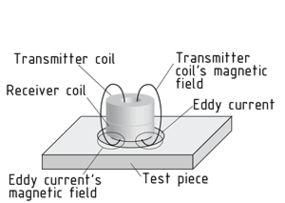
一种定义
四种语言
0,1,2
- 德國
- 英語
- 中國
- 西班牙語
Eddy current testing

The eddy current test is a non-destructive Material testing method. Amongst other things, it can be used to analyse the impact of Heat treatment on e.g. hardness, Strength or Hardening depth, and also the purity and content of alloying elements in metals.
Measurement is based on electric eddy currents with no defined direction that are induced in the test piece by a coil with an alternating current flowing through it. These eddy currents cause a magnetic field that in turn acts on the coil. This action is influenced by structural deviations, damage and impurities and can be detected using a Sensor. The amplitude and phase displacement relative to the excitation signal are amongst the parameters determined. The measuring signal is defined based on Conductivity, Permeability and the distance between detector and material surface. Comparing the signals with those of defect-free reference specimens enables statements to be made about the deviations present.
Test coils enable wall thicknesses and the uniformity of e.g. foils and metal sheets to be measured. They are also ideal for checking errors on individual parts as long as they can be inserted into bores. In addition to this, eddy current tests can be used to sort parts based on properties such as purity, porosity and hardness.
